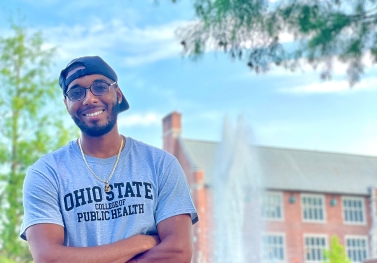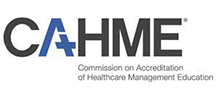Passion for disease investigation flourishing at Ohio State

Emmanuela Aboagye-Mensah, a senior specializing in environmental public health with a minor in biology, has sights set toward a PhD and has made sure to become active in student organizations, volunteerism and community research.
Why did you choose public health?
Being the offspring of an immigrant, I have seen firsthand the institutionalized measures that yield lower quality of care for minority groups, including but not limited to medical racism and lower access to care, medication and quality food. Pursuing public health has allowed me to study the factors involved in health disparities and to actively investigate how to close the gaps in care to improve the health of minorities.
Can you tell us a bit about your extracurricular work and activities?
I’m involved in the Minority Association of Pre-Medical Students, and as former secretary I helped build our first-ever lecture series in spring 2019, during which local doctors were invited as speakers to address the challenges they faced as pre-medical students and to share advice and resources. I’ve also been part of Buckeyes for Public Health. As outreach chair, I actively sought volunteer opportunities from neighboring communities and organized our participation in the 2019 Walk to End Alzheimer’s.
During spring break of 2019, I was able to travel with the College of Public Health to Washington D.C. This trip gave us exposure and insight into health policy, and we even had the opportunity to research health disparities we were passionate about and pitch solutions to government representatives.
Can you tell us a bit about your undergraduate research experience?
For the past three years, I have been conducting cardiometabolic and diabetes research through The Ohio State Wexner Medical Center Division of Endocrinology, Diabetes and Metabolism, under the amazing leadership of Dr. Joshua J. Joseph. In my first published academic paper, titled “The association of ideal cardiovascular health with self-reported Health, diabetes, and adiposity in African American males,” co-authors and I discovered that higher attainment of ideal cardiovascular health was correlated with improved self-perception of health, lower odds of diabetes and lower body mass index in black men.
How have these experiences enriched your time at Ohio State?
These experiences have allowed me to utilize the material I’ve learned inside lecture halls right in my community. It is phenomenal going from listening to a lecturer speak on health behavior to going into a community to actually conduct an interventional study on implementing healthy behaviors. Being behind the scenes and getting a firsthand experience on the methodology and planning that goes into such an experimental study is truly enriching.
What advice would you give incoming students?
Being that Ohio State is such a large institution, I would advise incoming students to find their niche and to flourish within it! This can be done by joining one or more student organizations, finding volunteer communities and just overall networking. Being active on campus expands your horizons and allows you to make an impact outside of the classroom.
How do you see your education shaping your future?
The undergraduate education I’ve received at Ohio State has equipped me with the knowledge and skills to further my pursuits in epidemiology and medicine. Through learning and growing in independent thinking, I have become even more passionate about disease investigations, particularly in the field of health policy.











